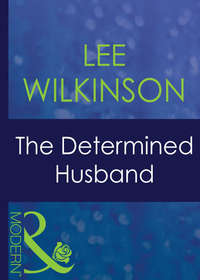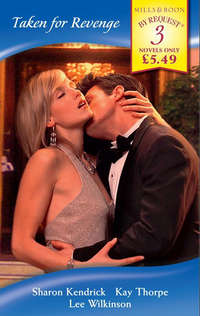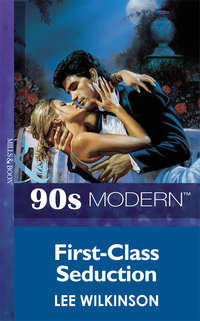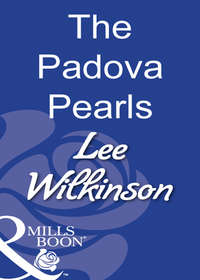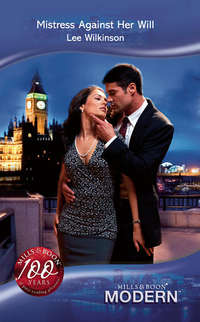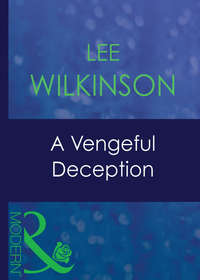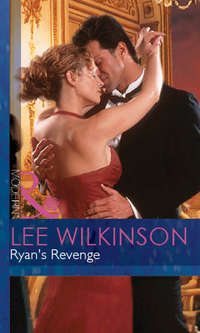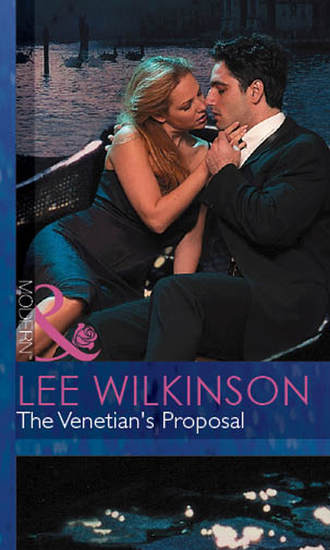
Полная версия
The Venetian's Proposal

“I know it must have looked as if I was throwing myself at you, but it was quite accidental. I just lost my balance.” Nicola felt her face flame.
“Really?” Dominic drawled. His cynical expression told her clearly that he didn’t believe a word of it. “So you’re saying it wasn’t a come-on?”
“That’s exactly what I’m saying.”
He smiled grimly. “I suppose next you’ll be swearing you didn’t want to go to bed with me, and trying to blame me for seducing you?”
“I’ve no intention of trying to blame you for seducing me. I did want to go to bed with you.”
Dominic raised a dark, mocking eyebrow. “Tell me, Nicola, do you feel the urge to sleep with every new man you meet?”
LEE WILKINSON lives with her husband in a three-hundred-year-old stone cottage in an English village, which most winters gets cut off by snow. They both enjoy traveling and recently, joining forces with their daughter and son-in-law, spend a year going around the world “on a shoestring” while their son looked after Kelly, their much-loved German shepherd dog. Lee’s hobbies are reading and gardening and holding impromptu barbeques for her long-suffering family and friends.
The Venetian’s Proposal
Lee Wilkinson

CONTENTS
CHAPTER ONE
CHAPTER TWO
CHAPTER THREE
CHAPTER FOUR
CHAPTER FIVE
CHAPTER SIX
CHAPTER SEVEN
CHAPTER EIGHT
CHAPTER NINE
CHAPTER TEN
CHAPTER ONE
‘PLEASE come in and take a seat, Mrs Whitney.’
Tall and slender in a navy suit, her corn-coloured hair taken up in a smooth knot, Nicola found herself ushered into a room that was solidly old-fashioned. Plum-coloured carpets, heavy velvet curtains, and above an empty fireplace a wooden mantel that held a ticking clock.
After coffee and condolences, Mr Harthill got down to business. ‘The last time my client was in London he asked me to draw up a new will. In my capacity as executor, I can now tell you that you are the sole beneficiary of that will.’
Staring across a polished mahogany desk at the saggy-jowled solicitor sitting impassively in his brown leather chair, Nicola could only manage to stutter, ‘I—I beg your pardon?’
‘You are the sole beneficiary,’ Mr Harthill Senior repeated patiently. ‘When all the formalities have been observed, you will be a wealthy woman.’
A polite letter summoning Nicola to the West End offices of Harthill, Harthill and Berry had merely stated that Mr John Turner had passed away some three weeks earlier, and that if she would call she would learn ‘something to her advantage’.
Shocked and saddened by the death of a man she had known for such a short time but liked immensely, she had kept the appointment.
The news that John Turner had made her the sole beneficiary to a fortune she hadn’t been aware existed had come as a bombshell.
‘But why me?’ She spoke the thought aloud.
‘I gather that Mr Turner didn’t have any children of his own…’
No, John had never mentioned having a family.
‘As well as his business interests,’ Mr Harthill continued staidly, ‘my client’s estate includes the proceeds from the sale of his London home, and a small palazzo in Venice, known as Ca’ Malvasia. He and his wife were very happy there, I understand.’
The London house Nicola had known about. John had mentioned his intention of putting it on the market, saying it was too big and too empty and he was hardly ever there. But his ‘small palazzo’ in Venice she hadn’t. Though she was aware that John’s deceased wife, Sophia, had been Italian.
‘Is that where he died?’ was all she could think of to ask.
Mr Harthill, used to euphemisms and looking a little distressed by her plain speaking, answered, ‘No. Ca’ Malvasia has been shut up since his wife passed away some four years ago. My client was in Rome on business when he suffered a fatal heart attack…’
She hoped someone had been with him. That he hadn’t died alone.
‘It wasn’t totally unexpected,’ the solicitor went on, ‘and he had made provision. In the event of his death I was to give you this package, which I believe holds a set of keys to the palazzo.’
He handed her a small, thick envelope sealed with tape which bore her name and the address of the Bayswater flat she shared with her friend Sandy.
‘If you wish to view the property I can put you in touch with my Venetian counterpart, Signor Mancini, who has been the family’s solicitor for a number of years. He will be only too happy to help with your travel arrangements and show you the palazzo. Should you decide to sell, he can take the appropriate measures to have it put on the market.’
Sounding as dazed as she felt, Nicola said, ‘I’ll need to make some plans…take time off work.’
‘Of course.’ Mr Harthill rose to his feet to show her out. ‘If I can be of any further service in the meantime, please let me know.’
‘Thank you. You’ve been very kind.’ She smiled at him. A smile that brought warmth to her heart-shaped face and lit up her green eyes.
A beautiful woman, he thought as they shook hands, and tragically young to be a widow. Even a rich one.
When Nicola let herself into the flat Sandy, a small vivacious redhead, was waiting, agog with excitement.
‘I’ve made some tea. Come and tell all.’
Friends since their days at business college, and flatmates for the past three years, the pair were complete opposites. One an introvert. The other an extrovert.
Even before her young husband’s fatal car crash Nicola had been quiet and self-contained, a woman who tended to stand alone in the wings and watch.
Whereas Sandy, outgoing and outspoken, was at her best bouncing off people.
In what seemed to be a case of role-reversal Sandy worked from home, as an information consultant, sitting in front of a computer screen in what she described as solitary confinement, while Nicola liaised with people, travelling almost non-stop as a conference organizer for Westlake Business Solutions.
Together they went through to the bright little kitchen and sat down at the pine table, where Sandy poured tea for them both.
Nicola accepted a mug and said simply, ‘John made me his sole beneficiary. It seems I’m going to be a wealthy woman.’
Sandy gave a silent whistle.
‘Apart from his business interests and the money from the sale of his London house, there’s also a small palazzo in Venice.’
‘You’re joking!’
‘No, I’m not.’
‘Did you know he had a place in Venice?’
‘No, he never mentioned it.’
‘Sure you haven’t got it wrong?’
‘Certain. It’s called Ca’ Malvasia. I’ve even been given a set of keys to it.’
Taking the padded envelope from her bag, Nicola tore off the tape and tipped the contents on to the table.
As well as a bunch of ornate keys on an iron ring there was a small chamois pouch with a drawstring neck and a letter.
While Sandy examined the keys, Nicola unfolded the letter and read in John’s small, neat writing:
Nicola, my dear, though we’ve known each other just a short time, you’ve been like the daughter I always wanted, and your warmth and kindness have meant a lot to me.
In the pouch you’ll find Sophia’s ring. Since she died I’ve been wearing it on a chain around my neck, but now I sense that I haven’t got much longer I’m lodging it with Mr Harthill.
It’s a singular ring. My darling always wore it. She was wearing it the day I met her. She once remarked that if any ring possessed the power to bring its wearer happiness, this one did. For that reason I would like you to have it, and I truly believe Sophia would approve.
Though we had both been married before, she was the love of my life as, I hope and believe, I was hers. We were very happy together for five wonderful years. Not long enough. But perhaps it never is.
In your case, I know your time with your husband was very brief. You’re desperately young to have known so much grief and pain, and I’m only too aware that anyone who loses a loved one needs time to mourn. But remember, my dear, no one should mourn for ever. It’s time you moved on. Be happy.
John
Blinking away her tears, Nicola passed the letter to Sandy, and, while the other girl read it quickly, picked up the chamois pouch and unfastened the drawstring. Tilting the pouch, she gave it a slight shake, and a ring slid into her palm.
Both women caught their breath.
It was exquisitely wrought, with twin ovals of glittering green stone sunk at an angle in the softly glowing gold setting.
‘I’ve never seen anything like it.’ Sandy’s face held awe. ‘What’s it meant to be?’
Her voice unsteady, Nicola said, ‘It looks like a gold mask, with emeralds for eyes.’
‘Try it on,’ Sandy urged.
With a strange feeling of doing something portentous, Nicola slid it on to her finger.
After Jeff’s death she had lost weight to the point of becoming gaunt, and it was just a fraction too large.
‘Even if it’s only costume jewellery it looks fantastic!’ Sandy enthused. ‘Though it may be a little too spectacular to wear to the local supermarket.’
‘You’re right,’ Nicola agreed. ‘It would look more at home in Piazza San Marco.’
‘Are you going to wear it?’
‘At the moment I’d be scared of losing it. But I’ll certainly keep it with me.’
‘You speak Italian, don’t you? Have you ever been to Venice?’
‘No.’
‘Wouldn’t you like to go?’
‘Yes, I would,’ Nicola said slowly. ‘I was thinking about it on the way home. I’ve time owing to me, so I might take a holiday. Stay there for a while.’
‘Glory be!’ Sandy exclaimed. ‘A sign of life at last. I’d about given up hope. You haven’t had a holiday since Jeff was killed.’
‘There didn’t seem much point. It’s no fun staying in a hotel full of strangers. In any case, it’s too much like work.’
‘But you won’t need to stay in a hotel when you have your very own palazzo.’
Nicola half shook her head. ‘I can still hardly believe it.’
Her smooth forehead wrinkling into a frown, Sandy remarked curiously, ‘I wonder why John Turner never mentioned having a house in Venice?’
‘Talking about it might have conjured up too many ghosts. He absolutely adored his wife, and couldn’t get over her death. It’s one of the reasons he worked so hard and travelled so much…’
Nicola had done the same, only to find that pain and grief couldn’t be left behind. They had travelled with her, constant companions she had been unable to outstrip.
Though she’d never found it particularly easy to make friends, she and John Turner had met and, drawn together by circumstances and their mutual loss, become firm friends—overnight, almost. The immediacy of their friendship had never been discussed or questioned, just accepted.
‘Though there was an age difference of over thirty years, John and I had a lot in common. I was very fond of him. I’ll miss him.’ With a lump in her throat, she added, ‘I’d like to see the house where he and his wife were so happy.’
‘Well, now’s your chance.’ Sandy’s tone was practical.
‘Why don’t you come with me?’
‘I can’t say I’m not tempted, but I’ve too much work on. Besides, Brent would hate me to go to Venice without him. Apart from believing that English women find all Italian men fascinating, he thinks Italian men tend to stare at English women… And while he might not mind them looking, if it came to bottom-pinching…’
‘I rather hope it won’t.’
‘You should be so lucky!’ Sandy said with a grin. ‘So how will you travel? Fly, as usual?’
‘I’m tired of flying, seeing nothing but airports…’ With a sudden determination to lay her own ghosts, Nicola decided, ‘I think I’ll drive down…’
Jeff, who had been the elder by six months or so, had passed his own driving test and taught her to drive in a small family saloon when she was just seventeen. But since his death she hadn’t driven.
‘In early June the weather should be good, so I think I’ll plan a scenic route and take a leisurely trip, stopping three or four nights on the way. I’d love to see Innsbruck.’
Hiding her surprise, Sandy observed, ‘While not wishing to spoil your fun, I must point out that you don’t have a car.’
‘I can always hire one.’
‘And I’ve heard the price of parking in Venice is astronomical. But I don’t suppose you need to worry about it now. By the way, now you’ve money to burn I expect you’ll want to live somewhere a bit more up-market?’
Before Nicola could answer, she added, ‘Don’t think I’m trying to push you off, but Brent is itching to move in. I’ve kept the poor lamb waiting because I wasn’t sure how you’d feel about having an extra flatmate, and a man to boot.’
‘So you’ve decided to live together?’
‘For a trial period. If it works out we may get married. Brent would like to.’
‘Well, let me know if you want to spend your honeymoon in a palazzo…’
Without envy, Sandy said cheerfully, ‘I do like having rich friends.’
Signor Mancini, when notified of Nicola’s intentions, had proved almost embarrassingly eager to be of assistance. Though she had assured him that it wasn’t necessary, he had advised her where to stay, and gallantly insisted on making all the hotel bookings.
For some reason, and without ever hearing his voice, Sandy had taken a dislike to the man. She now called him ‘the slimy git’. But, unwilling to hurt his feelings, Nicola had thanked him and, abandoning her busman’s holiday, accepted his well-meant help.
The only thing she had vetoed was that he should meet her on her arrival in Venice and personally conduct her to the hotel.
There was really no need to take up his valuable time, she had insisted politely, and it would tie her to being there at a certain hour.
Her last planned stop before Venice was Innsbruck, and she arrived in the picturesque Austrian city in the early afternoon.
Signor Mancini had arranged for her to stay at the Bregenzerwald, a nice-looking modern hotel just off the impressive Maria-Theresien-Strasse.
Nicola parked her hired car in the underground car park and, leaving her main suitcase in the boot, collected her small overnight bag and took the lift up to the elegant foyer.
It was deserted at that time of the day, except for the desk-clerk and a thick-necked, bullet-headed man sitting by the window, who glanced up at her approach.
Having studied her for a moment, he retired once more behind his newspaper while she completed the formalities and was handed her room key.
It was her first visit to the capital of the Tyrol and, liking Innsbruck on sight, she decided to see as much as she possibly could in the relatively short time at her disposal.
As soon as she had showered and changed into a cream linen dress and jacket she made her way down to the foyer again, to find the same man was still sitting there, intent on his newspaper.
Having collected a street map from the desk, she turned to go.
The bullet-headed man had abandoned his paper and, his gaze fixed on her, was talking into a mobile phone. Their eyes met briefly, and perhaps embarrassed to be caught staring—even absently—he instantly looked away.
Map in hand, Nicola made her way into the sunny street, and after getting her bearings set off to explore.
There were plenty of horse-drawn carriages offering sightseeing tours, but, needing to stretch her legs following the day’s drive, she decided to walk.
The sky was cloudless, the sun warm enough to make her push up the sleeves of her jacket, but traces of snow were still visible on the surrounding Alps.
After a look at the milky-green, fast-flowing Inn river, she made her way to the old part of town. The Altstadt, with its famous golden-roofed balcony and bulbous-domed Stadtturm tower, was colourful and bustling with tourists.
Strolling through the narrow, cobbled lanes, she was stepping back to admire one of the painted buildings when the thin heel of her court shoe slipped into a crack between the smooth stones and wedged tightly.
As she struggled to free it she heard the clatter of approaching hooves bearing down on her.
A second later she was swept up by a pair of strong arms and whisked to safety, while the horse-drawn carriage rattled harmlessly past.
For a moment or two, shaken, she lay with her head supported by a muscular shoulder, vaguely aware of the feel of silk beneath her cheek and the fresh masculine scent of cologne.
Then, pulling herself together, she raised her head and said a trifle unsteadily, ‘Thank you. Believe me, I’m very grateful.’
‘It was, perhaps, unnecessarily dramatic…’ His voice was attractive, well-educated, his English perfect with only the faintest trace of an accent. ‘But I’m glad I was on hand.’
Her rescuer was darkly handsome, without being swarthy, and just looking into his face took what was left of her breath away.
Apart from the colour of his eyes, he was a lot like her husband. Jeff’s eyes had been a warm, cloudy blue, whereas this man’s were a cool, clear grey. His hair was thick and raven-black—cut just short enough to restrain its desire to curl—his face lean and hard-boned, with a straight nose and a firm, chiselled mouth.
As she stared at him as though mesmerised, he said, ‘Now I’d better retrieve your footwear.’
Setting her down carefully, so she could lean against the plastered wall of a building, he stepped out into the roadway.
He was tall and broad-shouldered and moved with an easy, masculine grace. Well, but casually dressed, in stone-coloured trousers and an open-necked shirt, he could have been simply a holidaymaker.
But there was something indefinable about him—a kind of sureness? An air of authority?—that convinced her he wasn’t.
Having eased the shoe free, he carried it back. ‘The heel’s a little scuffed, but apart from that it’s undamaged.’
Settling on his haunches, he slipped the court shoe on to her slender foot, before straightening to his full height—some six feet plus.
Looking down at her heart-shaped face, with its pure bone structure and flawless skin, he commented, ‘You still look shaken…’
She was. But not for the reason he imagined.
‘What you need is that panacea for all ills, a nice cup of tea.’
His hand beneath her elbow, he led her round a corner to the Stadsbiesl, a tiny restaurant with overhanging eaves and white stucco walls. Its tiled roof sloping every which way, the old building leaned, supported like an amiable drunk between its neighbours.
A tunnelled archway gave access to a small sunny courtyard with three or four unoccupied tables covered with red-checked tablecloths.
‘But perhaps, as you’re fair-skinned, you’d prefer to be indoors?’ he asked.
She shook her head. ‘I love the sun and, so long as I don’t do anything foolish, I tan quite easily.’
‘Then al fresco it is.’
He helped her off with her linen jacket and hung it over the back of her chair.
The moment they were seated a white-coated waiter appeared with a pitcher of iced water and two glasses.
‘Just tea?’ Nicola’s companion enquired. ‘Or would you like to try a plate of the delectable cakes they serve here?’
‘I had a late lunch, so just hot tea with lemon, thank you.’
He gave the order in fluent German, though she felt sure it wasn’t his native tongue.
As the waiter moved away she remarked, ‘You seem to know the Stadsbiesl well?’
‘Yes. I eat here from time to time.’ Studying her, he added, ‘Your colour’s coming back. Feeling better?’
‘Much better.’
‘On holiday?’
‘Yes.’
‘Is this your first time in Innsbruck?’
‘Yes.’ Reluctantly, she added, ‘Though I’m only staying for one night. I’m on my way to Venice.’
‘From England?’
‘Yes. I’m driving down. Taking the scenic route.’
‘It’s a magnificent run over the Brenner Pass.’
‘I’m sure it must be. I’m looking forward to it.’
But not so much as she had been.
Their pot of tea arrived, strings and tags dangling from beneath the lid. It was accompanied by a silver bowl of sugar cubes and another of thinly sliced lemon. On each bowl there was a pair of silver tongs shaped like twin dragons joined at the tail.
Indicating the pot, he suggested, ‘Perhaps you’ll pour?’
‘Of course. Lemon and sugar?’
‘Just lemon, please.’
She filled both cups, and passed him one. Then, made unusually clumsy by the knowledge that he was studying her, she dropped a piece of lemon into her own, so that it splashed tea down the bodice of her dress.
Getting to his feet, he felt in his pocket and produced an immaculate handkerchief. He dipped the corner into the pitcher of water and leaned over her to rub gently at the orange-brown stains.
Though his touch was light and impersonal, every nerve-ending in her body responded, and she felt her cheeks grow hot.
He moved back and, his head tipped a little to one side, studied the results of his ministrations. ‘There are still one or two faint marks but nothing too obvious.’
‘Thank you,’ she said in a strangled voice.
‘It was my pleasure entirely,’ he responded, straight-faced.
Uncertain whether or not he was laughing at her, she gathered herself, and, needing a topic of conversation, asked a shade breathlessly, ‘Do you live in Innsbruck?’
‘No, I’m here on business.’ His eyes on her face, he went on, ‘I live in Venice.’
‘Oh…’ For no reason at all, her heart lifted.
Still watching her, as though he was half expecting some reaction, he added deliberately, ‘My name’s Loredan… Dominic Irving Loredan.’
‘Are you Italian?’ was all she could think of to say.
‘Half. My father was from the States, but my mother was Italian.’
So that accounted for the faint and fascinating accent she had noticed, and also for the eloquent way he used his long well-shaped hands when he was speaking.
‘You’re English, I take it?’
‘Yes. I’m Nicola Whitney.’
He glanced at her wedding ring. ‘Mrs Whitney, I see.’
‘Yes… No… Well, yes…’
Raising a dark winged brow, he commented, ‘You seem a little uncertain.’
‘I—I’m a widow,’ she stammered.
Perhaps afraid of pitying exclamations, or maybe because to say it aloud made it all too real, this was only the second time she had voluntarily admitted her widowhood.
‘You’re very young to be a widow,’ he remarked evenly.
‘I’m twenty-five.’
‘When did your husband die?’
‘Three years ago.’
‘And you’re still wearing your ring?’
She still felt married.
When she said nothing, he pursued, ‘Was his death some kind of accident?’
Because his question was matter-of-fact, unemotional, she was able to answer steadily, ‘Yes. He was killed in a car crash.’
‘So you’re on your own?’
‘I share a flat with a friend, Sandy.’
‘He’s not holidaying with you?’
‘No, I’m alone… And Sandy’s a she.’
Now why had she found it necessary to tell a complete stranger that? she wondered. Other people had made the same mistake and she hadn’t bothered to correct them.
More than a little flustered, she hurried on, ‘We met at college, and after Jeff, my husband, died she invited me to share her flat. I would have liked her to come with me, but she’s a self-employed information consultant and she had too much work on.’


